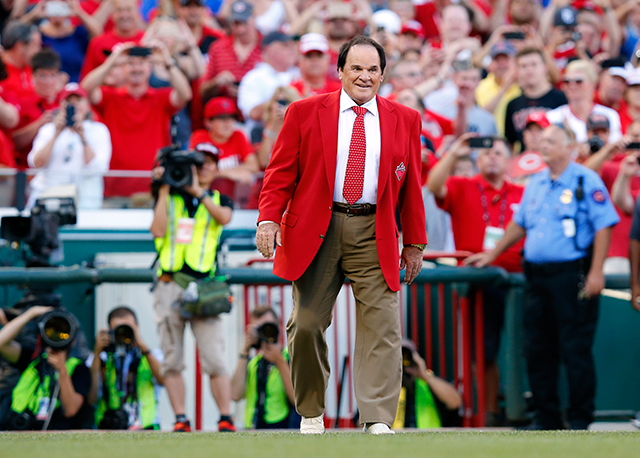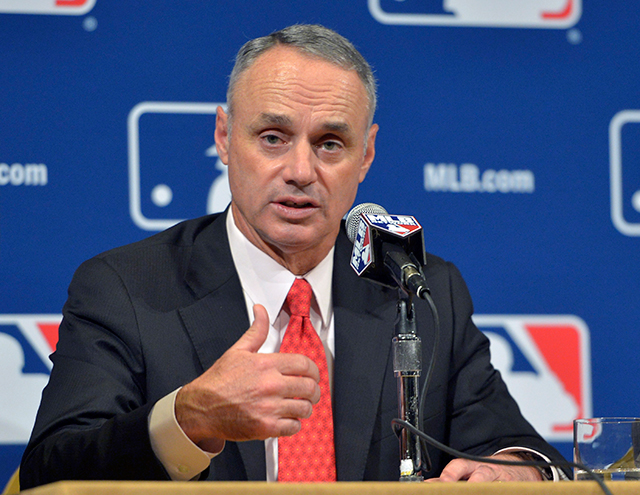The New York Times reported Monday that Rob Manfred has declined to reinstate Pete Rose, a decision that probably disappoints some but surprises few. Rose was placed on the ineligible list in 1989 when it was found that he bet on baseball when he was manager of the Cincinnati Reds and, while he since has participated in a few Major League Baseball events from time to time, being banned has meant no chance for the Hall of Fame. Admission to Cooperstown is the thing Rose wants most of all, and given that he's 74 years old, it's unlikely that he'll ever get in alive. Or even dead.
And it remains Rose's own fault. He had a chance to be straight with commissioner Rob Manfred when they met in September, but instead Rose dodged the entire truth about his history as a baseball gambler.

Back in June, ESPN's Outside the Lines reported that Rose bet on Major League Baseball when he was a player, which he has denied ever since the first gambling allegations came out in 1989. After years of lying, Rose came clean about betting on Reds games as a manager, in a book published in 2004. In a statement released Monday in connection with his own announcement, Manfred referred to those allegations, which stem from evidence collected by federal investigators who were trying to build a case against Rose for tax evasion -- for which Rose eventually went to prison. The evidence wasn't available to MLB at the time of Rose's banning, Manfred said:
I should point out that my staff obtained important evidence not available at the time of the Dowd Report, including a copy of a notebook taken by federal investigators from Michael Bertolini in October 1989 and kept from public examination since that time by court order. This notebook contains records of bets placed by in 1986 by Michael Bertolini on his own behalf and on the behalf of Pete Rose, including bets made on Cincinnati Reds games by Mr. Rose during the 1986 Championship Season when he was manager-player for the Cincinnati Reds.
Not only has Rose never admitted to gambling on Reds games while he played, but he dodged the truth when given a chance to set the record straight with Manfred in September. Rose said he couldn't remember what happened in 1986 regarding his betting, after giving Manfred "extensive" recollections about what happened in 1987. He offered an unconclusive lie detector test and an unsubstantiated psychiatric test -- which Manfred says he dismissed because it conflicted with the truth.
Why would Rose continue to lie? Ever since charges first were leveled, part of Rose's defense has been that he never bet on the Reds to lose. It wasn't an important distinction to the rule itself, which says no one is allowed to bet on baseball, period -- to win or lose. Rose probably thought, as long as he kept up the story that he never fixed games or put himself in position to throw them, he would keep a certain amount of support. Not only from fans, but also from reporters who vote for the Hall of Fame, should it ever come to that.
Also: There's a certain crowd of Rose supporters (fans and Hall of Fame voters) who separate actions Rose took as a player against those he did as a manager. He's the all-time hits leader as a player, and worthy of being in Hall of Fame, the argument goes. What he did as a manager is irrelevant to that. Well, if Rose admits he bet on baseball as a player, that line is forever erased. It would hurt him in Hall of Fame votes, theoretically, and it would cost him fans. Memorabilia purchasers. If Rose never gets the Hall, at least he'd still be in business selling his autograph.
Manfred's press release included another disturbing revelation.

Rose also told Manfred that he still bets on professional sports, including baseball. It was told to Rose in 1989 by commissioner Bart Giamatti that he needed to "reconfigure" his life, and that included no more gambling. Well, he's still gambling, and MLB made it a stipulation for reinstatement that he stop. He might not be able to stop because he's addicted -- but Pete Rose having a disease also doesn't mean MLB necessarily should be sympathetic and waive the stipulation. It's possible an argument could be made, though, and perhaps Rose still could get himself on a track to stop gambling.
But even if he weren't still an active gambler, Rose being unwilling to admit that he gambled as an active player is all Manfred needs in order to say "no" to reinstatement. A person saying he has "reconfigured" his life is irrelevant if he won't admit the full truth about what happened 30 years ago. Rose remains in a catch-22. If he tells the whole truth, it's possible -- however unlikely -- that he'd be reinstated by MLB. It's also possible that enough Hall of Fame voters would hold it against him if he did. And what good would reinstatement do him then?




















